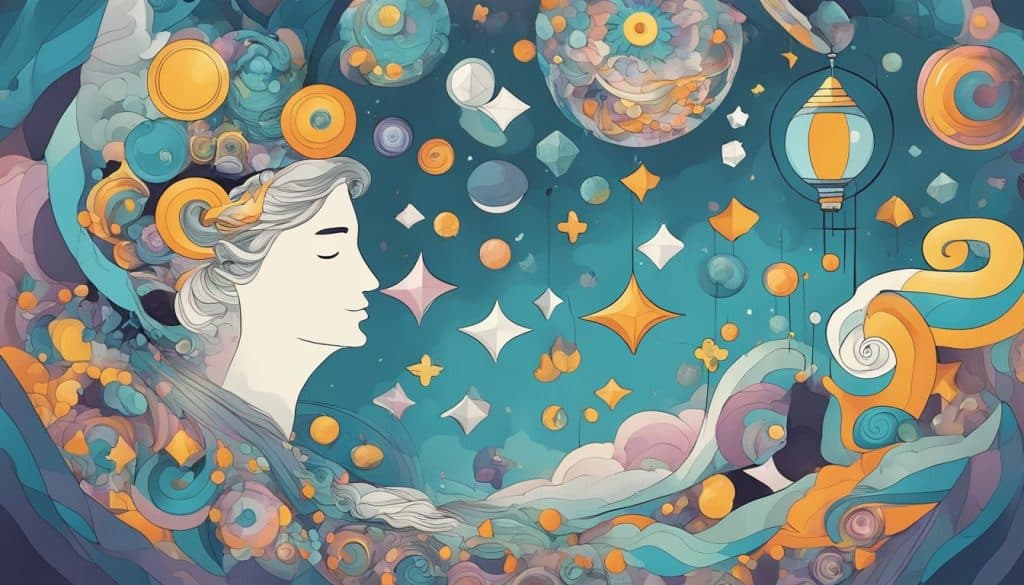Dreams are an essential part of the human experience, intersecting with our health, science, and the deeper workings of our psyche. While we spend about one-third of our lives sleeping, the dream world remains one of the most enigmatic frontiers of our understanding. Though some dreams have been connected to our subconscious, reactions to stress, or processing of daily events, there are occurrences within dreams that defy explanation.
Table of Contents
Toggle
Unexplained dream occurrences can range from precognitive visions to intensely vivid scenarios that challenge our perceptions of reality. These instances often spark curiosity and provoke questions about their significance and origins. Science has yet to fully unravel the complexities of why we dream the way we do, leaving much of the territory uncharted. Despite the mystery, the journey into the realm of dreams invites a closer look at the confluence of the psychological, cultural, and social dimensions that shape our nocturnal narratives.
Key Takeaways
- Dreams are a vital, yet mysterious part of human health and psychological understanding.
- Some dream occurrences cannot be explained by current scientific knowledge.
- An examination of dreams includes cultural, psychological, and social perspectives.
Dream Fundamentals

In this journey through the nocturnal realms of the mind, you’ll gain insight into the scientific understanding of sleep and dreams, and decode the cryptic messages woven into your dream content.
The Science of Sleep and Dreams
REM sleep, the stage closely associated with dreaming, is a crucial component of your sleep cycle. During this phase, your brain activity escalates, akin to when you’re awake. Studies have shown differences in dream frequency and content between men, women, and children, which might be influenced by various factors, including biology (potentially DNA), mental health status, and even sleep disorders. Scientists have found that a lack of REM sleep, also known as sleep deprivation, may have serious implications for both your physical and mental well-being.
Understanding Dream Content
Examining the meaning of dreams can feel like trying to decipher a riddle from another reality. Common themes, such as flying dreams, a falling dream, or recurring dreams, might be your mind’s method of reflecting deeper emotions or rehearsing for real-life challenges. While nightmares may cause distress, they could also be a signpost for underlying anxieties. Vivid dreams have the power to linger in your memory long after you’ve awakened, suggesting a profound connection between dreaming and your waking life. Whether these dreamscapes serve a specific purpose or are simply byproducts of the brain’s nocturnal activities remains a topic of investigation by scientists and dream explorers alike.
Psychological Perspectives

In exploring the realm of our nightly visions, you’ll find that psychological research and theories provide a framework for understanding how dreams could reflect your mental health and what your recurring dreams might signify.
Dreams and Mental Health
Dreams can act as a mirror to your inner psyche, offering glimpses into your mental health. For instance, recurring dreams or nightmares could be a signal of unresolved stress, anxiety, or trauma in your life. Scientific studies, such as those discussed in Linking psychological need experiences to daily and recurring dreams, suggest that frustrating experiences in waking life often manifest with negative emotions in dreams, highlighting a dynamic link between your dream content and psychological needs.
Interpretations of Common Dream Themes
The way you interpret dream symbols can be highly personal, but certain themes have universal meanings grounded in psychology:
- Flying: Often associated with a sense of freedom or escape from reality, flying in dreams may indicate a desire for liberation from stress or anxiety.
- Falling: This sensation might hint at fear of losing control, failure, or an impending letdown in some aspect of your personal or professional life.
- Sex: Dreams involving sexual activity could reveal your desires, but they might also symbolize the merging of different aspects of self or a longing for connection.
- Dying or Death: Such dreams can evoke fear but may not be literal; they’re sometimes interpreted as representing change or the end of something in life rather than physical death.
Psychologists emphasize that while common themes exist, the meaning of your dreams is most accurately deciphered by considering your unique circumstances and feelings. For an in-depth dive into the psychology behind dream generation, consider the insights from Converging theories on dreaming, which combine several psychological perspectives.
Dream Anomalies and Disorders

Discovering the night’s mysteries often leads to encountering phenomena within the depths of sleep that defy ordinary explanation. As you close your eyes each night, you might not be simply resting but rather crossing into a realm where dream anomalies and disorders manifest with profound and sometimes disturbing regularity.
Parasomnias and Unusual Sleep Experiences
Parasomnias encompass a range of sleep disorders that involve unwanted experiences or actions. These occurrences can significantly impact your sleep quality and overall health. Here’s a rundown of the most notable ones:
-
Nightmares: Intense, disturbing dreams that can cause you to awaken feeling anxious and afraid. They are more than just bad dreams, often replaying fears and stress from your waking life.
-
Sleep Paralysis: Occurs when you’re partially awake but can’t move or speak; a twilight zone between being asleep and awake where your body remains immobilized. It is often accompanied by sensory experiences that some describe as supernatural.
-
Somniloquy (Sleep Talking): Ranges from harmless mutterings to intricate dialogues, giving voice to your unconscious mind.
-
Sleepwalking (Somnambulism): Undertaking complex activities, from wandering to complex tasks, while in a state of partial arousal.
-
Hypnic Jerks: Sudden, involuntary twitches that occur as you’re falling asleep. These jolts might feel alarming but are typically harmless.
-
Exploding Head Syndrome: Characterized by the perception of loud noises, such as a bomb exploding or a clash of cymbals, just as you’re about to fall asleep or wake up.
Each of these conditions reveals the fascinating yet mysterious interaction between your brain’s conscious control centers and the subconscious processes at play during sleep. Monitoring and understanding these parasomnias are crucial for maintaining good sleep health and mitigating their potentially disruptive effects on your life. For a deeper insight into the unique and bizarre sleep phenomena known as parasomnias, consider reading expert analysis on the subject at Psychology Today.
Cultural and Social Aspects

The landscapes of your dreams are often reflections of cultural narratives and social stimuli. They can be powerful enough to touch on the profound aspects of culture and religion, while also being influenced by modern social and technological landscapes.
Dreams in Culture and Religion
Culture: Dreams often serve as a canvas where the tapestry of your culture is painted vividly. In various cultures, dreams are integral to religious rituals and spiritual guidance. For example, indigenous societies like the BaYaka and Hadza often experience dreams that begin with threats but lead to a resolution, signifying the role of community and spiritual beliefs in overcoming challenges.
Religion: On the religious front, dreams hold great significance. They are sometimes considered divine messages, giving them an edge of mystery. In some traditions, dreams can guide you to freedom in your spiritual journey or warn you of dangers, offering a sense of security.
Social and Technological Influences on Dreams
Social Aspects: Your dreams can be affected by the pressure of societal expectations and life events. They might reflect the stress or aspirations that stem from your social interactions or the roles you play within your community.
Technology: Platforms like Instagram have begun to blur the lines between reality and the digital world, influencing your subconscious and, consequently, your dreams. The constant influx of images and ideas can push the boundaries of your dreaming landscape, making you question the nature of reality and the concept of freedom within the confines of the digital sphere.
In this interconnected world, the cultural and social aspects of your dreams are more intertwined than ever, providing you with rich insights into both your personal psyche and the collective consciousness.
Frequently Asked Questions

In exploring the realm of dreams, certain questions often press for clarity, especially when peculiar patterns in our sleep startle or bewilder us.
What causes vivid dreams that disrupt sleep multiple times a night?
Your sleep architecture can be influenced by myriad factors, from stress to your diet. Vivid dreams that interrupt your sleep frequently could stem from life’s pressures or even medications you’re taking. For an in-depth look at this topic, you can read about the mental experiences during sleep on Psychology Today.
Are there common types of dreams that have specific meanings?
While dreams are subjective, certain archetypes do appear across various cultures and individuals. For example, dreams about falling or being chased often correlate with anxiety. However, interpretations aren’t universal. To explore different types of dreams and their potential meanings, consider reviewing resources such as Psych Central.
How can I differentiate a dream from reality when they feel similar upon waking?
Dreams can sometimes be so vivid that they blur the lines with reality upon waking. Reality checks, such as reading text or checking the time, can confirm your status, as these tasks become difficult to do consistently in dreams. For further reading on this, Psychology Today offers insights into dreaming phenomena.
Is there a connection between frequent bizarre dreams and an underlying condition?
While atypical dreams can simply be a facet of your dream life, they can also signify stress, sleep disorders, or psychological issues. It’s important not to jump to conclusions and consider consulting a sleep specialist or psychologist if these dreams are troubling or persistent. The Cleveland Clinic has more information on how dreams may relate to your health.
Can recurring nightmares serve as a warning or indicate something significant?
Nightmares that reoccur might be your subconscious processing unresolved conflicts or stress. If the content of nightmares is specific and consistent, it could be related to past trauma or fears. To understand this phenomena better, digest the insights on WebMD about dreams and nightmares.
What is known about rare or unusual dream experiences?
Rare dream experiences, like uncharacteristically clear or prescient dreams, might remain elusive, but they can also offer a window into your subconscious mind. Much about these uncommon dreams is still shrouded in mystery, though scientific inquiry continues to shed light. If you’re attracted to the enigmatic nature of dreams, you might be interested in the theories and speculative aspects available on Psychology Today.






